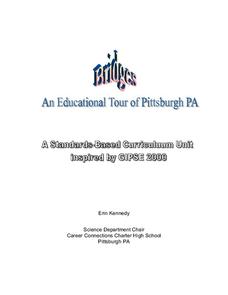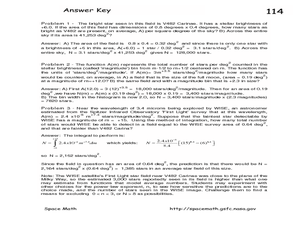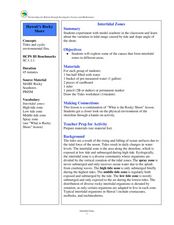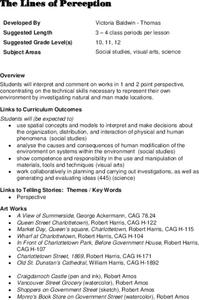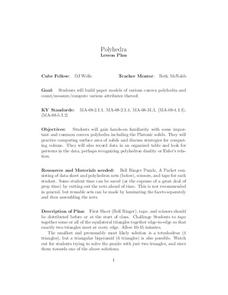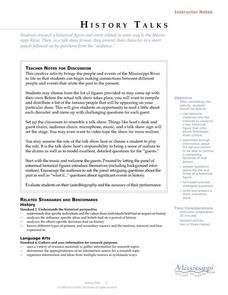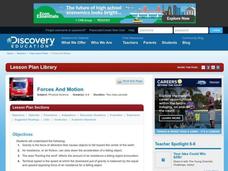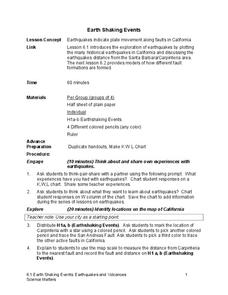Curated OER
Barnegat Bay Watershed
Middle schoolers design a model watershed. In this watershed lesson, students learn the needed parts of a watershed and how they work. Middle schoolers evaluate how watersheds effect communities.
Curated OER
Bridges
Students are introduced to the different types, designs and nature of bridges. They observe a historical look at the bridges in and around the Pittsburgh area through a video presentation. Connections are made between science and...
Curated OER
Exploring Power-Law Functions Using WISE Data!
In this power-law functions worksheet, students solve 3 problems using data from the Wide-field Infrared Survey Experiment in the constellation Carina. Students use a photograph to determine the number of stars as bright as the brightest...
Curated OER
Washington D.C.
Learners research monuments in Washington, D.C. In this geography lesson, students research one monument and use the Internet to gather information. Learners create a three-dimensional model of their monument.
Curated OER
Intertidal Zones
Students explore intertidal zones. In this intertidal zones lesson, students work in small groups and use ready-made materials to create a model of intertidal zones. Resources are provided.
Curated OER
National Service: Lesson Plan
Students explore and take postions on the concept of mandatory community service. They then debate the issue in class as a learning model.
Curated OER
Earthquakes Rock!
Students study the main methods to measure earthquakes; the Richter Scale and Mercalli Scale. They make a model of a seismograph and investigate which structural designs are most likely to survive an earthquake.
Curated OER
The Lines of Perception
Students interpret and comment on works in 1 and 2 point perspective. They locate the focal point of works done in 1 point perspective and create a drawing of a street or landscape in their local area using 1 point perspective.
Curated OER
Polyhedra
Students analyze convex polyhedra through hands on methods. In this geometrical shapes lesson, students construct paper models of convex polyhedra and identify the different properties including the number of sides, faces and edges.
Curated OER
Lord of the Rings - A Study of Tree Rings
Students examine trees and discuss how the environment effected the tree. They also predict what the area look like in fifty years.
Curated OER
History Talks
Students engage in a lesson that deals with a historical figure from the area of Mississippi. Then questions are asked of them using a game show format that is followed with additional ones used for brainstorming for more ideas of inquiry.
Curated OER
Forces and Motion
Students build parachutes for chicken eggs. In this physics lesson plan, students describe the forces acting on a falling object. They predict which of the three parachute models they made has the best chance of keeping the egg intact...
DiscoverE
Spaceship to Mars
Feel like a rocket scientist for the day. Using only paper and tape, scholars create a framework for a spaceship to Mars. Each sheet of paper costs $10 million and each piece of tape costs $100,000. Make sure you stay within budget!
Science Matters
Slip Sliding Along
The San Andreas Fault is the largest earthquake-producing fault in California. In the seventh lesson plan in the 20 part series, pupils create maps of California, focusing on the San Andreas Fault system. The comparison of where...
Science Matters
Earth Shaking Events
The world's largest measured earthquake happened in 1960 in Chile, reaching a terrifying 9.5 magnitude on the Richter Scale. The second lesson in the 20-part series introduces earthquakes and fault lines. Scholars map where previous...
Noyce Foundation
Photographs
Scaling needs to be picture perfect. Pupils use proportional reasoning to find the missing dimension of a photo. Class members determine the sizes of paper needed for two configurations of pictures in the short assessment task.
National Wildlife Federation
Yesterday: Our Energy Needs Over Time
How has our relationship to energy changed over time? An engaging exploration challenges learners to create a timeline showing human energy needs and uses over time. Scholars review what timelines are, choose a 50-year period in history...
Channel Islands Film
Arlington Springs Man: Lesson Plan 2
West of the West's documentary Arlington Springs Man and a two-page scientific article about the same topic provide the text for a reading comprehension exercise that asks individuals to craft a one page summary of information gathered...
American Press Institute
Creating a Classroom Newspaper
Hot off the press: a mini-unit for class members to create their own newspaper. Complete with graphic organizers, extension activities, and helpful learning targets that teach parts of a newspaper, the resource contains everything needed...
Curated OER
Imaginary Insect Zoo
Students create imaginary insects that contain essential characteristics of an insect, such as six legs and three body parts. In this Science/Arts lesson, students distinguish between an insect and non-insect. Students create their...
Curated OER
Algebra I: Multiplying Polynomials and Factoring
Students use concrete models (algebra blocks) to demonstrate their processes for solving quadratic equations. They apply the commutative, associative, and distributive properties to simplify algebraic expressions and to solve quadratic...
Curated OER
The Spider Beside Her
Second graders expand their knowledge of spiders. By creating a model of a spider, 2nd graders recognize differences between spiders and insects and determine that a spider is not an insect.
Curated OER
TE Activity: The Great Divide
Students simulate the distribution of nonrenewable energy resources using cookies. They determine how the world's growing population effects the equitable distribution of these resources. They look at how engineers work to develop...
Curated OER
Wetlands: Pave or Save?
Students discuss the characteristics of wetlands and how to make them more productive. Using a map, they locate the major wetlands in the United States and color them using a key. They read an article and in groups answer discussion...



